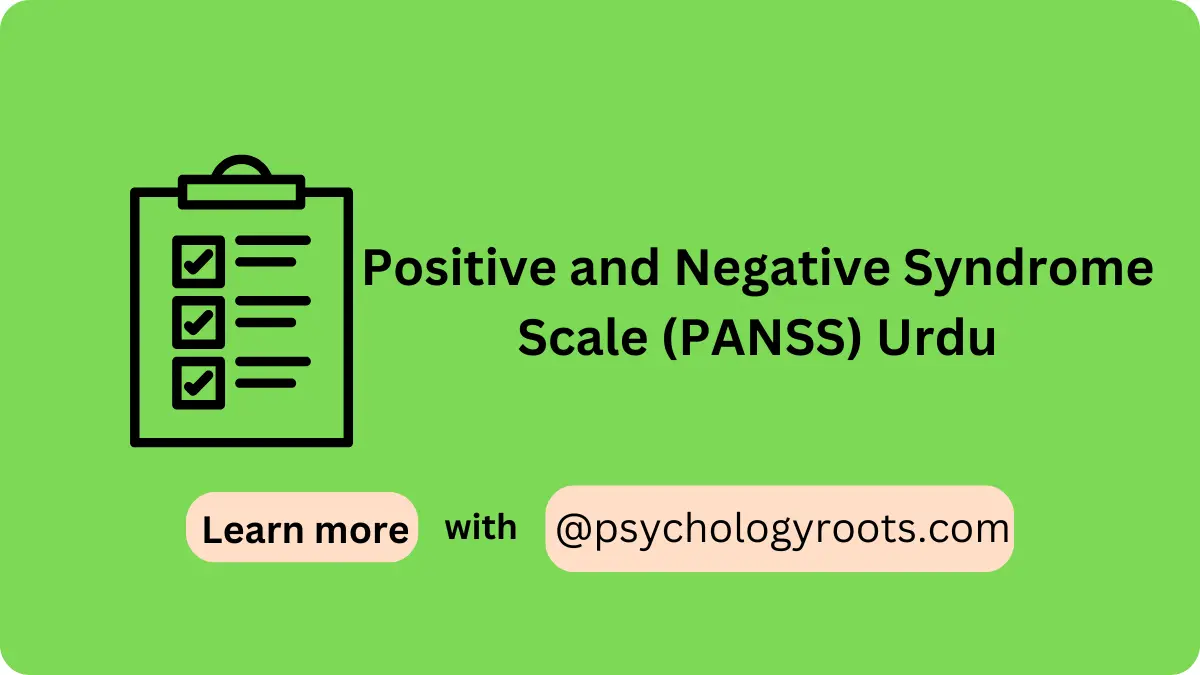Table of Contents
Positive and Negative Syndrome Scale (PANSS) Urdu
Here in this post, we are sharing the “Positive and Negative Syndrome Scale (PANSS) Urdu”. You can read psychometric and Author information. We have thousands of Scales and questionnaires in our collection (See Scales and Questionnaires). You can demand us any scale and questionnaires related to psychology through our community, and we will provide you with a short time. Keep visiting Psychology Roots.
About Positive and Negative Syndrome Scale (PANSS) Urdu
Scale Name
Positive and Negative Syndrome Scale (PANSS) Urdu
Author Details
Not Sure, Still searching
Translation Availability

Background/Description
The Positive and Negative Syndrome Scale (PANSS) is a clinical tool designed to assess the severity of symptoms in individuals with schizophrenia and other psychotic disorders. It evaluates three key dimensions of psychopathology:
- Positive Symptoms: Delusions, hallucinations, and thought disorders.
- Negative Symptoms: Emotional withdrawal, lack of motivation, and blunted affect.
- General Psychopathology: Symptoms like anxiety, depression, and hostility.
The PANSS comprises 30 items rated on a 7-point Likert scale (1 = absent, 7 = extreme). The Urdu version retains the original structure while ensuring linguistic and cultural appropriateness for Urdu-speaking populations. It is widely used in clinical settings, research, and treatment evaluations.
Administration, Scoring and Interpretation
- Obtain the Urdu Version: Access the validated PANSS Urdu version through authorized sources.
- Define the Purpose: Clearly outline the aim (e.g., diagnosis, symptom tracking, research).
- Provide Instructions: The clinician explains the process to the participant. Symptoms are evaluated through clinical observation and structured interviews.
- Administer the Scale: Assess all 30 items across the three domains: Positive (7 items), Negative (7 items), and General Psychopathology (16 items). Each item is rated on a scale from 1 (Absent) to 7 (Extreme).
Reliability and Validity
- The original PANSS demonstrated strong internal consistency with Cronbach’s alpha ranging from 0.73 to 0.83.
- The Urdu version has shown comparable reliability through validation studies in Urdu-speaking populations.
- The scale has strong construct and criterion validity, correlating well with other measures of psychosis.
- Validation of the Urdu version included cultural adaptations and pilot testing.
Available Versions
30-Items
Reference
Kay, S. R., Fiszbein, A., & Opler, L. A. (1992). Positive and negative syndrome scale. GROUP, 1, 4.
Kay, S. R., Fiszbein, A., & Opler, L. A. (1987). The positive and negative syndrome scale (PANSS) for schizophrenia. Schizophrenia bulletin, 13(2), 261-276.
Important Link
Scale File:
Frequently Asked Questions
What is the PANSS used for?
To assess symptom severity in individuals with schizophrenia and psychotic disorders.
How many items does the scale include?
The scale has 30 items divided into three subscales: Positive, Negative, and General Psychopathology.
Is the Urdu version validated?
Yes, the Urdu version has been culturally adapted and psychometrically validated.
Who can administer the PANSS?
Trained clinicians or researchers with expertise in psychosis assessment.
What does a higher PANSS score indicate?
A higher score reflects greater symptom severity.
Disclaimer
Please note that Psychology Roots does not have the right to grant permission for the use of any psychological scales or assessments listed on its website. To use any scale or assessment, you must obtain permission directly from the author or translator of the tool. Psychology Roots provides information about various tools and their administration procedures, but it is your responsibility to obtain proper permissions before using any scale or assessment. If you need further information about an author’s contact details, please submit a query to the Psychology Roots team.
Help Us Improve This Article
Have you discovered an inaccuracy? We put out great effort to give accurate and scientifically trustworthy information to our readers. Please notify us if you discover any typographical or grammatical errors.
Make a comment. We acknowledge and appreciate your efforts.
Share With Us
If you have any scale or any material related to psychology kindly share it with us at psychologyroots@gmail.com. We help others on behalf of you.